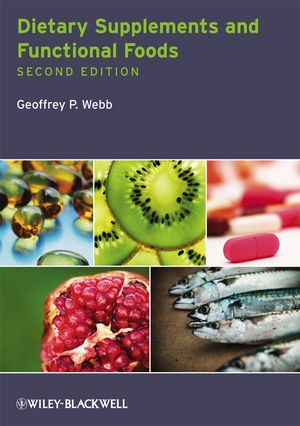Share
Fr. 116.00
Webb, Geoffrey P Webb, Geoffrey P. Webb, Geoffrey P. (University of East London) Webb, GP Webb, Webb Geoffrey P.
Dietary Supplements and Functional Foods
English · Paperback / Softback
Shipping usually within 1 to 3 weeks (not available at short notice)
Description
The study of nutritional supplements has become increasingly important within research establishments and universities throughout the world, and as the market for these products continues to grow, so does the need for comprehensive scientifically sound information about the products, their properties and potential health benefits.
This second edition of Dietary Supplements & Functional Foods has been fully revised and expanded. The book looks at the accepted uses of dietary supplements and also explores the wider picture, identifying common themes and principles or particular categories of supplements. Much new information across the whole spectrum of this fascinating and expanding field is included, with additional material covering changes in relevant legislation, examples of superfoods, up-to-date information and informed debate concerning vitamin D, folic acid, fish oils and antioxidants Several new sections have been added to this successful and well-received book. This book is now even more user-friendly and ideal for course use, and an invaluable reference for those working in the health sciences, and the supplements industry. Dietitians, nutritionists, food scientists and food technologists will all find much of great use and value within its covers. All universities and research establishments where these subjects are studied and taught should have copies of this excellent new edition on their shelves.
List of contents
Preface.
1 An Overview of Dietary Supplements and Functional Foods.
The evolving rationale for supplement use.
Adequacy and the prevention of deficiency diseases.
Diet as a means to prevent chronic, age and wealth-related diseases.
Supplements versus dietary change for the prevention of chronic disease.
Dietary supplements and natural remedies as a safer alternative to modern medicine?
Defining dietary supplements.
Legal regulation of dietary supplements(the UK and EU perspective).
Medicines.
Non-medicinal supplements.
Borderline products.
Health claims.
Vitamin and mineral supplements.
Regulation in the USA.
Supplement quality.
The market for supplements.
Reasons for taking supplements.
To compensate for a perceived or potential inadequacy in the diet.
To compensate for some perceived increase in need or defective handling of a nutrient.
To treat or prevent non-deficiency diseases.
To improve athletic performance.
Do supplements and functional foods work? Testing their effectiveness and safety.
Measures of outcome.
The two main investigative approaches.
The observational approach.
The experimental approach.
Testing: A summing up.
2 An Overview of Micronutrient Adequacy.
Introduction and scope of the chapter.
Judging the adequacy of micronutrient intakes.
A note about American standards.
Recommended daily allowances on food labels.
Measuring an individual's micronutrient status using clinical or biochemical observations.
Micronutrient adequacy of the UK population.
Young and middle-aged adults.
Children.
Pregnant women.
Lactating women.
The elderly.
Athletes in training.
Summing up.
3 The Individual Vitamins.
The fat-soluble vitamins.
Vitamin A (retinol).
Vitamin D (cholecalciferol).
Vitamin E (±-tocopherol).
Vitamin K (phylloquinone).
The water-soluble vitamins.
Vitamin B1(thiamin).
Vitamin B2(riboflavin).
Vitamin B3 (niacin).
Vitamin B6 (pyridoxine).
Vitamin B12 (cobalamins).
Folic acid (folate, folacin).
Biotin.
Pantothenic acid.
Vitamin C (ascorbic acid).
4 The Minerals.
Calcium.
Chromium.
Copper.
Fluoride.
Iodine.
Iron.
Magnesium.
Manganese.
Molybdenum.
Potassium.
Selenium.
Zinc.
5 Free Radicals and Antioxidants.
Introduction.
The free radical or oxidant theory of disease.
Mechanisms for limiting free radical damage.
Diets with plentiful supplies of (antioxidant-rich) fruits and vegetables are associated with a reduced risk of chronic diseases.
What evidence is there that antioxidant supplements are beneficial or at least harmless?
Antioxidants and pre-eclampsia in pregnancy.
Vitamin E and dementia.
Summing up the case for antioxidant supplements.
6 Natural Fats and Oils.
The nature of fats, oils and other lipids.
Why are we preoccupied with the balance of our dietary fats?
Why are some fatty acids called 'essential'?
Essential fatty acids and eicosanoid production.
Fish oil supplements.
What are the suggested benefits of tak
About the author
Dr Geoffrey P Webb is Senior Lecturer in nutrition and physiology at the University of East London, School of Health and Bioscience, UK.
Summary
The study of nutritional supplements has become increasingly important within research establishments and universities throughout the world, and as the market for these products continues to grow, so does the need for comprehensive scientifically sound information about the products, their properties and potential health benefits.
Product details
| Authors | Webb, Geoffrey P Webb, Geoffrey P. Webb, Geoffrey P. (University of East London) Webb, GP Webb, Webb Geoffrey P. |
| Publisher | Wiley, John and Sons Ltd |
| Languages | English |
| Product format | Paperback / Softback |
| Released | 11.03.2011 |
| EAN | 9781444332407 |
| ISBN | 978-1-4443-3240-7 |
| No. of pages | 330 |
| Subjects |
Guides
Natural sciences, medicine, IT, technology > Medicine Ernährung, Ernährungslehre, Nutrition, Health & Social Care, Gesundheits- u. Sozialwesen |
Customer reviews
No reviews have been written for this item yet. Write the first review and be helpful to other users when they decide on a purchase.
Write a review
Thumbs up or thumbs down? Write your own review.

